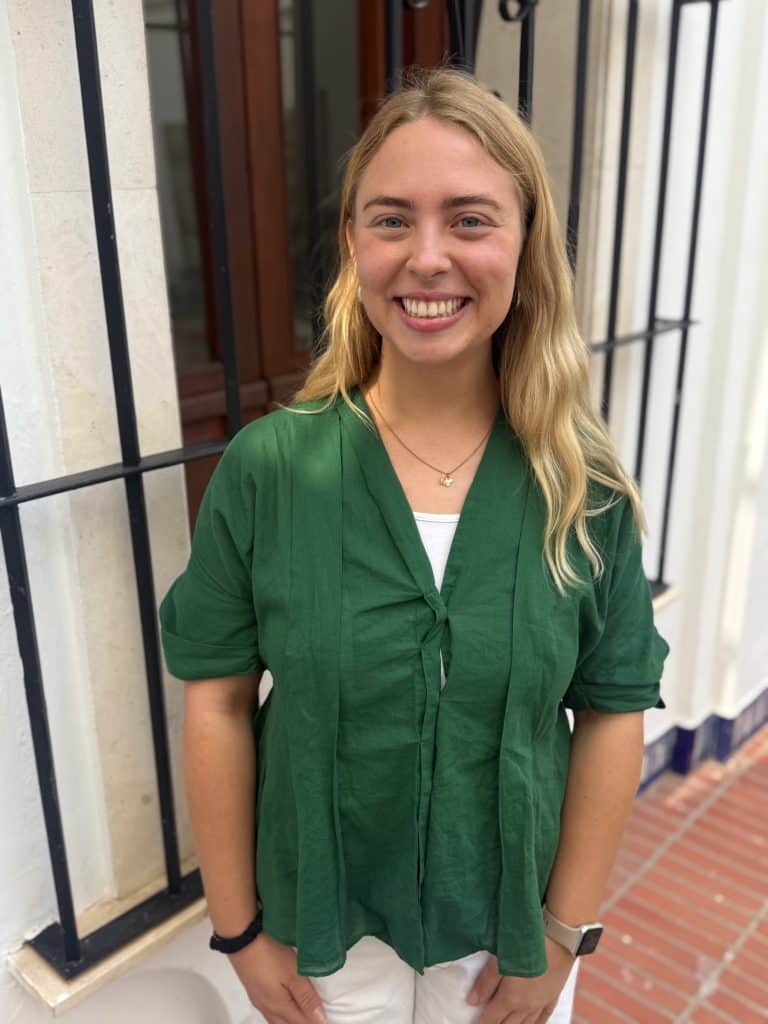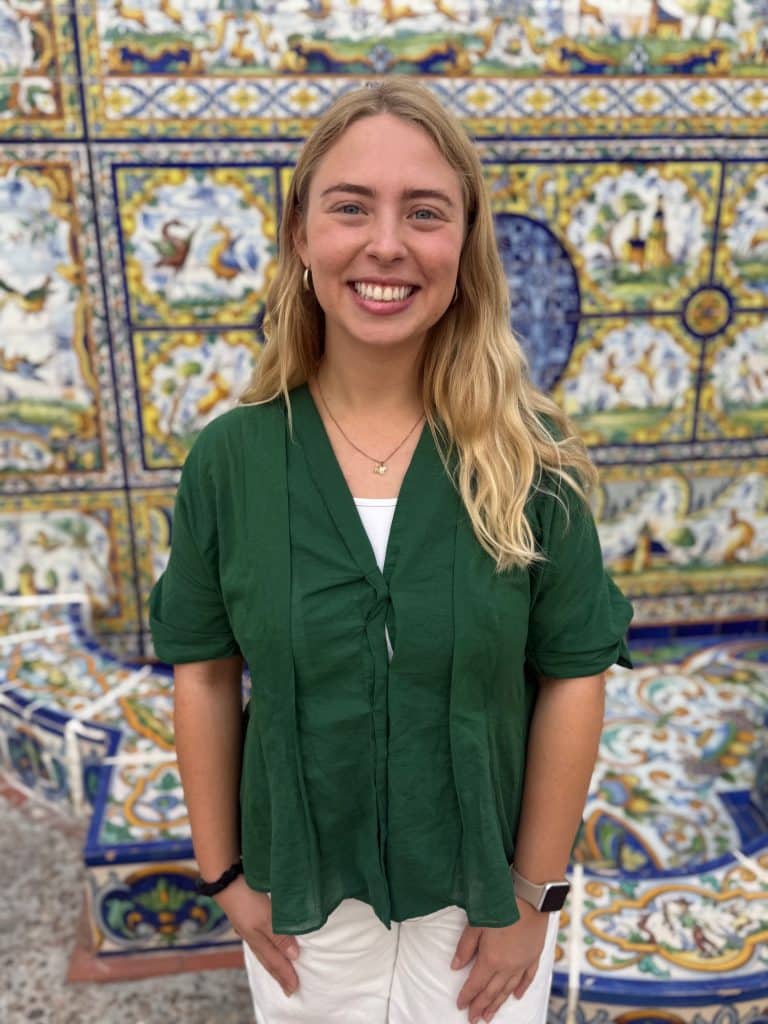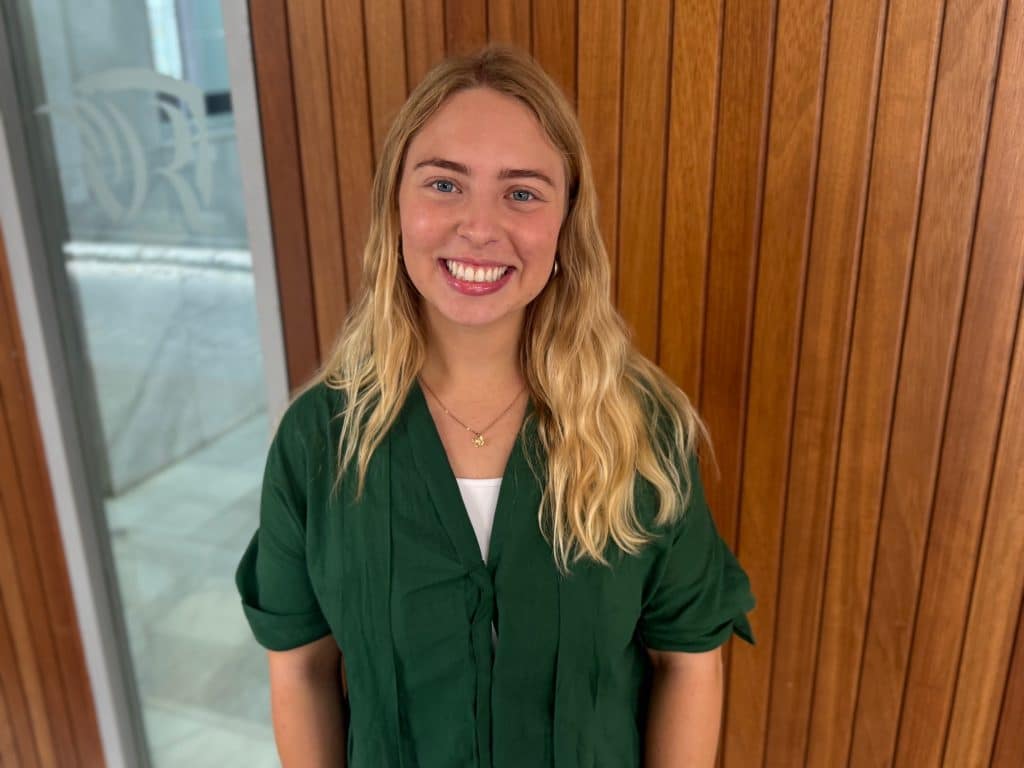A few days ago, Ribamar welcomed the language assistant for the 2025/26 school year. We spoke with her to learn more about her work, her plan with the Secondary and Vocational Training students, and her interests. We invite you to read the interview and get to know Emily a little better.
1. Could you introduce yourself and tell us your name and your city of origin?
Hello everyone! My name is Emily and I am from Fargo, North Dakota in the United States. It’s a small city, close to Canada, with about 130,000 people and extremely cold winters!
2. What motivated you to become a language assistant?
I was motivated to become a language assistant because I was intrigued by the opportunity to work in another country and teach. I have been working with kids all my life and this seemed like an exciting next step for me. I want to challenge myself and help others improve their English.
3. Why did you choose Spain, and specifically Seville, as your destination
A few years ago, I visited Spain (and Sevilla) for the first time with my high school Spanish class. From the moment I arrived, I fell in love with the city’s warmth, charm, and vibrant culture. The lively streets, the delicious food, and the friendliness of the people made a lasting impression on me, and I knew I wanted to return someday. After graduating from university, I discovered an opportunity to move to Spain as a language assistant, and I decided to make the move. I was placed in Sevilla for the 2024–2025 academic year, and it truly felt like coming home. When the year ended, I wasn’t ready to leave, so I applied for another program. I was thrilled to be placed again in Sevilla, this time at Ribamar for the 2025–2026 school year.
I love the food, the people, and the rhythm of daily life here. There’s always something to see or experience, from a spontaneous flamenco performance to a quiet evening by the Guadalquivir river. As the saying goes, “Sevilla tiene un color especial,” and for me, that couldn’t be more true. Sevilla has become more than just a place I live — it feels like home, and I can’t imagine being anywhere else in Spain.
4. What was the process like to get here and become a language assistant at our center?
The process has been manageable. I applied through a language assistant program and after some interviews, I was accepted and placed here at Ribamar. After receiving my placement I worked on renewing my student visa from my last year in Sevilla, which has been the most stressful part of the process. As a part of my language assistant program, I am also taking online classes at a university in Barcelona for teaching English as a second language. Although it has been a somewhat stressful process I am so grateful for the opportunity to be here and have this experience.
5. What projects or activities do you have planned to work on with our secondary school and vocational training students?
With secondary and vocational training students, I will be taking small groups of students out of class to practice speaking English. A lot of times students know grammar and read English well, but speaking is a challenge. My goal is to help students become more conversational and comfortable speaking English, and to help them think of English as a useful skill, and not just an academic subject. Along with speaking practice, throughout the year, we will learn about different holidays and cultural celebrations in English-speaking countries, as well as play games and do engaging activities to improve confidence in English.
6. What do you hope to contribute to the students during your stay?
I hope to contribute to helping students become more comfortable in speaking English. It can be scary to speak in another language, and I want to make learning English fun and interesting so that students hopefully keep learning, even outside of the classroom. Like I have mentioned, I want to help students think of English as a useful skill, rather than an academic subject.
7. What are your first impressions of the school and the students?
Everyone has been so warm and welcoming since I arrived. I am so excited to get to know the students and teachers more throughout the year!
8. What differences have you noticed between the education system in your country and that of Spain?
One difference I’ve noticed is how learning languages are really emphasized here in Spain. In most public schools in the United States, students only start learning a second language in high school, and many do not retain the language. In Spain, most schools from ages 5 and up are bilingual, and most students know more than one language. Another difference I’ve noticed has been how the system is set up. In the states, elementary school goes from kindergarten to grade 5 (ages 5-10), middle school is from grades 6-8 (ages 11-13) and high school is from grades 9-12 (ages 14-18). After graduating high school, students have the option to go to University and study whatever they choose, or work, or both! On the other hand, in Spain, the educational system is divided into preschool, primary (ages 6-12), secondary (ages 12-16), and bachillerato (ages 16-18).
9. What would you like to discover or experience during your stay in Seville?
Since I have been living in Sevilla for a year already, I’ve seen a lot of touristy things like the Cathedral, Alcázar, Triana neighborhood, etc. This year, I would like to discover more small towns in the area. I also want to discover new foods and be more part of the community and school.
10. Do you have any hobbies or interests that you would like to share with the students?
I enjoy going on walks, running, hiking, and camping. I love to cook and bake sweet treats, and I just started learning to crochet!
11. What do you like most about your culture that you would like to share here?
I like that the culture in America is very hard-working, and that most Americans are very driven people. They take risks and learn from failure. I would like to share that here, especially with learning English, and that you do not have to be perfect at another language, but as long as you practice and learn from mistakes, you will succeed!
12. What challenges do you think you might encounter and how do you plan to address them?
I think I may encounter challenges where people do not want to speak English because they think it’s too hard, not useful ,or that they feel embarrassed speaking, so they give up and don’t practice at all. I plan to address that by making engaging activities and working with each student’s level. That may include pairing students with a lower English level with stronger students, or practicing speaking and listening exercises in small groups to help improve the student’s confidence in English.
13. What do you hope to take away from this experience on a personal and professional level?
On a personal level, I hope to take away a better understanding of the Spanish language and culture. Living abroad has helped me become more open-minded, adaptable, and confident in new situations, and it’s something that I deeply value. On a professional level, I want to strengthen my communication and intercultural skills, which are essential in today’s world. This experience as a language assistant will also help me learn how to collaborate with people from different backgrounds, which is something that will benefit me in any future career.

Hace unos días Ribamar recibió a la auxiliar de conversación para este curso 2025/26. Hemos hablado con ella para conocer mejor su labor, el plan de trabajo con el alumnado de ESO y Formación Profesional y sus gustos. Os invitamos a leer la entrevista y conocer un poco más a Emily.
EMILY DUNLAP: «MUCHAS VECES LOS ALUMNOS CONOCEN LA GRAMÁTICA Y LEEN BIEN, PERO HABLARLES EN INGLÉS RESULTA A VECES DIFÍCIL»
1. ¿Podrías presentarte y contarnos tu nombre y tu ciudad de origen?
¡Hola a todos! Me llamo Emily y soy de Fargo, Dakota del Norte, en los Estados Unidos. Es una ciudad pequeña, cerca de Canadá, con unos 130.000 habitantes y unos inviernos extremadamente fríos.
2. ¿Qué te motivó a convertirte en auxiliar de conversación?
Me motivó convertirme en asistente lingüístico porque me intrigaba la oportunidad de trabajar en otro país y enseñar. He trabajado con niños toda mi vida y esto me pareció un paso emocionante para mí. Quiero ponerme a prueba y ayudar a otros a mejorar su inglés.
3. ¿Por qué elegiste España y, en concreto, Sevilla como destino?
Hace unos años, visité España (y Sevilla) por primera vez con mi clase de español del instituto. Desde el momento en que llegué, me enamoré de la calidez, el encanto y la vibrante cultura de la ciudad. Las animadas calles, la deliciosa comida y la amabilidad de la gente me causaron una impresión duradera, y supe que quería volver algún día.
Después de graduarme en la universidad, descubrí la oportunidad de mudarme a España como auxiliar de conversación y decidí dar el paso. Me destinaron a Sevilla para el curso académico 2024-2025 y realmente me sentí como si volviera a casa. Cuando terminó el año escolar, no estaba preparada para marcharme, así que solicité otro programa. Me emocionó que me destinaran de nuevo a Sevilla, esta vez a Ribamar, para el curso 2025-2026.
Me encanta la comida, la gente y el ritmo de la vida cotidiana aquí. Siempre hay algo que ver o experimentar, desde un espectáculo de flamenco improvisado hasta una tranquila velada a orillas del río Guadalquivir. Como dice el refrán, «Sevilla tiene un color especial», y para mí eso no podría ser más cierto. Sevilla se ha convertido en algo más que el lugar donde vivo: la siento como mi hogar y no me imagino viviendo en ningún otro sitio de España
4. ¿Cómo fue el proceso para llegar hasta aquí y convertirte en auxiliar de conversación en nuestro centro?
El proceso ha sido manejable. Presenté mi solicitud a través de un programa de auxiliares de conversación y tras varias entrevistas, me aceptaron y me asignaron aquí, en Ribamar. Una vez asignada mi plaza, me puse a renovar mi visado de estudiante del año pasado en Sevilla, que ha sido la parte más estresante del proceso. Como parte de mi programa de auxiliares de conversación, también estoy tomando clases online en una universidad de Barcelona para enseñar inglés como segunda lengua. Aunque ha sido un proceso algo complicado, estoy muy agradecido por la oportunidad de estar aquí y vivir esta experiencia.
5. ¿Qué proyectos o actividades tienes pensados para trabajar con nuestro alumnado de ESO y ciclos formativos?
Con los alumnos de ESO y ciclos formativos, sacaré a pequeños grupos de alumnos de clase para practicar el inglés oral. Muchas veces, los alumnos conocen la gramática y leen bien el inglés, pero hablarles a veces resulta difícil. Mi objetivo es ayudar a los alumnos a conversar con mayor fluidez y sentirse más cómodos hablando inglés, así como ayudarles a considerar el inglés como una habilidad útil y no solo como una asignatura académica. Además de practicar la expresión oral, a lo largo del año aprenderemos sobre diferentes fiestas y celebraciones culturales de los países de habla inglesa, y realizaremos juegos y actividades interesantes para mejorar la confianza en el inglés.
6. ¿Qué esperas aportar a los estudiantes durante tu estancia?
Espero contribuir a que los alumnos se sientan más cómodos hablando inglés. Hablar en otro idioma puede dar miedo, y quiero que aprender sea divertido e interesante para que los alumnos sigan mejorando, incluso fuera del aula. Como he mencionado, quiero ayudar a los alumnos a considerar el inglés como una habilidad útil, en lugar de una asignatura académica
7. ¿Cuáles son tus primeras impresiones sobre el centro educativo y sobre los estudiantes?
Todo el mundo ha sido muy amable y acogedor desde que llegué. ¡Estoy deseando conocer mejor a los alumnos y profesores a lo largo del año!
8. ¿Qué diferencias has notado entre el sistema educativo de tu país y el de España?
Una diferencia que he notado es cómo se enfatiza realmente el aprendizaje de idiomas aquí en España. En la mayoría de las escuelas públicas de Estados Unidos, los estudiantes solo comienzan a aprender un segundo idioma en la escuela secundaria, y muchos no retienen el idioma. En España, la mayoría de las escuelas a partir de los 5 años son bilingües, y la mayoría de los estudiantes saben más de un idioma. Otra diferencia que he notado es cómo está organizado el sistema. En Estados Unidos, la escuela primaria va desde el jardín de infancia hasta el quinto curso (de 5 a 10 años), la escuela secundaria va del sexto al octavo curso (de 11 a 13 años) y el instituto va del noveno al duodécimo curso (de 14 a 18 años). Después de graduarse en la escuela secundaria, los estudiantes tienen la opción de ir a la universidad y estudiar lo que elijan, o trabajar, ¡o ambas cosas! Por otro lado, en España, el sistema educativo se divide en preescolar, primaria (de 6 a 12 años), secundaria (de 12 a 16 años) y bachillerato (de 16 a 18 años).
9. ¿Qué te gustaría descubrir o vivir durante tu estancia en Sevilla?
Como ya llevo un año viviendo en Sevilla, he visto muchos lugares turísticos como la catedral, el Alcázar, el barrio de Triana, etc. Este año me gustaría visitar más pueblos pequeños de la zona. También quiero descubrir nuevos alimentos y formar parte de la comunidad y la escuela.
10. ¿Tienes algún hobby o afición que te gustaría compartir con el alumnado?
Me gusta salir a caminar, correr, hacer senderismo y acampar. Me encanta cocinar y hornear dulces, ¡y acabo de empezar a aprender a hacer ganchillo!.
11. ¿Qué es lo que más te gusta de tu cultura que quisieras dar a conocer aquí?
Me gusta que la cultura estadounidense sea muy trabajadora y que la mayoría de los estadounidenses sean personas muy motivadas. Asumen riesgos y aprenden de los fracasos. Me gustaría compartir eso aquí, especialmente con el aprendizaje del inglés, y que no es necesario ser perfecto en otro idioma, pero siempre que practiques y aprendas de los errores, ¡tendrás éxito!.
12. ¿Qué desafíos piensas que puedes encontrar y cómo planeas afrontarlos?
Creo que puedo encontrarme con retos en los que la gente no quiera hablar inglés porque piensan que es demasiado difícil, que no es útil o que les da vergüenza hablarlo, por lo que se rinden y no practican en absoluto. Mi plan es abordar eso creando actividades atractivas y trabajando con el nivel de cada estudiante. Eso puede incluir emparejar a los estudiantes con un nivel de inglés más bajo con estudiantes más fuertes, o practicar ejercicios de expresión oral y comprensión auditiva en pequeños grupos para ayudar a mejorar la confianza de los estudiantes en el inglés.
13. ¿Qué esperas llevarte de esta experiencia a nivel personal y profesional?
A nivel personal, espero adquirir un mejor conocimiento de la lengua y la cultura españolas. Vivir en el extranjero me ha ayudado a ser más abierta, adaptable y segura de mí misma en situaciones nuevas, y es algo que valoro profundamente. A nivel profesional, quiero fortalecer mis habilidades comunicativas e interculturales, que son esenciales en el mundo actual. Esta experiencia como asistente lingüístico también me ayudará a aprender a colaborar con personas de diferentes orígenes, algo que me beneficiará en cualquier carrera profesional futura.


